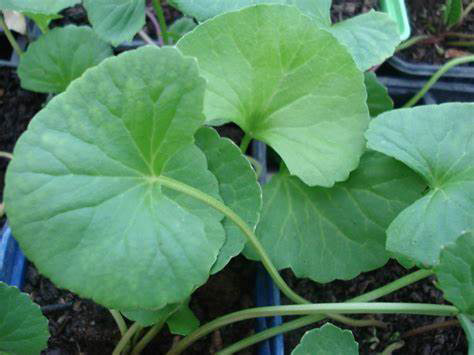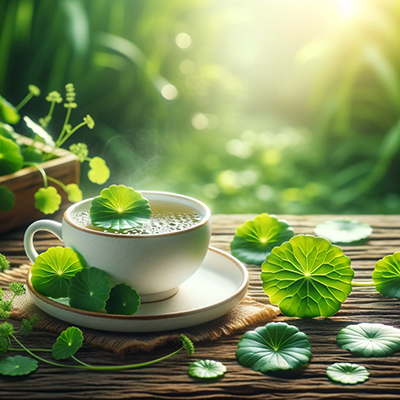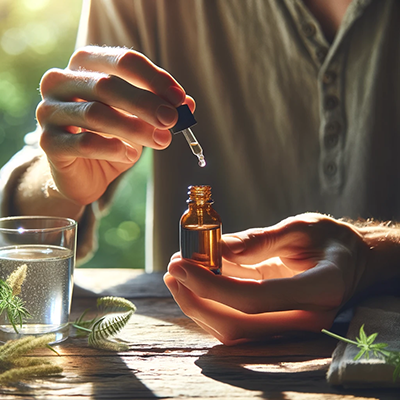Centella asiatica, often known as gotu kola, is a perennial plant Indigenous to the marshes of Asia and is well known as “The Herb of Longevity.” It has a long history dating back thousands of years. It is a crucial component of both traditional Chinese medicine and Ayurvedic treatment. This extraordinary plant is well-known for its many health advantages, which vary from improving cognitive function to enhancing skin health.
What is Gotu Kola?
This tiny, herbaceous perennial plant belongs to the Apiaceae family. It may be found in Southeast Asia, sections of India, and marshy areas of Eastern Europe. The plant has fan-shaped leaves, tiny pinkish-red or white blooms, and small, oval-shaped fruit.
Health Benefits of Gotu Kola

- Parts of the plant used: Tops
- Medicinal properties: Tonic, nervine, alterative, antipyretic, and diuretic.
- What it affects: Brain, kidneys, nerves, bladder, and circulation
Cognitive Enhancer
Gotu kola is well recognized for its capacity to protect neurons. Numerous studies have shown that it improves cognitive function, including learning and memory. Triterpenoids, which comprise most of the chemicals in gotu kola, increase antioxidant activity in the brain, lowering oxidative stress and defending the brain against harm. As a result, gotu kola is a well-liked dietary supplement among students and people seeking to improve their cognitive function.
Gotu Kola Benefits for Skin

Gotu kola is recognized for its conceivable advantages for maintaining healthy skin. Its medicinal effectiveness is attributed to a unique blend of bioactive substances, including triterpenoid saponins (primarily asiaticoside and madecassoside), flavonoids, and phytosterols. Let’s examine some of its main skin advantages:
Boosts Collagen Production: Gotu kola might encourage the skin’s natural collagen production. The essential protein collagen gives your skin its structure and flexibility. It helps preserve skin firmness and elasticity by increasing collagen synthesis, which may help lessen the visibility of wrinkles and fine lines.
Wound Healing: In the past, this herb was used to cure wounds. Studies show that it may hasten healing by promoting collagen synthesis and tissue regeneration where the lesion is located. It also has anti-inflammatory properties that may help to lessen swelling and erythema surrounding wounds.
Treatment of Skin Conditions: Gotu kola has been used to treat skin conditions such as psoriasis, eczema, and varicose ulcers. Its anti-inflammatory and antioxidant properties may help reduce the inflammation and oxidative stress related to these diseases.
Enhances Microcirculation: The herb may boost the skin’s microcirculation, boosting nutrient availability and producing a more attractive complexion.
Antioxidant Effects: The plant’s potent antioxidant properties help prevent skin damage from free radicals and environmental stressors, reducing wrinkle appearance and maintaining skin health.
Antimicrobial Properties: According to specific research, gotu kola may also possess antibacterial properties that might help prevent skin infections and promote healthier skin.
Anxiety and Depression Relief
Studies on gotu kola also indicate that it may aid in treating mental health conditions, including depression and anxiety. It has calming and anxiolytic properties that contribute to reducing anxiety. Additionally, the plant is adaptogenic, which helps the body cope with stress more successfully.
Cardiovascular Health
It has been discovered that gotu kola promotes cardiovascular health. It enhances circulation and aids in maintaining blood vessel integrity, lowering the risk of varicose veins and other vein-related diseases.
Gotu Kola Seeds
You may also add gotu kola seeds to your regimen. You can also grow your gotu kola plant from these little seeds since they are rich in triterpenes. With some care and a simple seed-planting ritual, you may have a supply of this fantastic herb for everyday use.
Gotu Kola for Hair
Gotu kola has fantastic effects on the health of your hair. Many hair products harness the potential of this plant by including it in their formulas. Applying gotu kola-infused products or massaging gotu kola oil into the scalp may hydrate hair follicles, fortify the hair shaft, and encourage healthier, shinier hair.
How to Use Gotu Kola?
Gotu Kola can be incorporated into your routine in several ways:
- Tea: The leaves may be brewed to make a calming herbal tea.
- Supplements: In capsules or tablets, Gotu kola is marketed as a nutritional supplement.
- Topical Applications: Gotu kola is a plant that may be used topically to remedy skin issues in creams or ointments.
As with any dietary supplement, it’s crucial to speak with a doctor before beginning a gotu kola regimen, particularly for those using drugs or with pre-existing medical concerns.
Gotu Kola Side Effects
Like other therapeutic herbs and dietary supplements, Gotu kola may have adverse effects, mainly if used in excess. It is usually considered safe when taken properly, although some may have negative effects. Listed adverse consequences include:
Allergic Reactions: Some individuals may have skin allergies, including itching, hives, or redness when using topical medications.
Upset Stomach: Some people may experience nausea, upset stomach, or diarrhea after ingesting gotu kola, especially if they eat it excessively.
Sedation: Given the soothing effects of gotu kola, too much lethargy or drowsiness may result, mainly if used with other sedative drugs or substances.

Liver Damage: There have been isolated cases of gotu kola causing liver damage. Users of drugs that may affect the liver or those with a history of liver illness should take this supplement with care.
Headache: After taking gotu kola, some people may get headaches.
Photosensitivity: If you take gotu kola, it could be a good idea to apply sunscreen or limit your time in the sun since there have been a few rare reports of increased sensitivity to sunlight.
Gotu kola is not recommended for use by pregnant or nursing women since there is insufficient trustworthy data on the herb’s safety during these times.
It is essential to remember that dietary supplements and herbs may interact with other drugs and medical problems. So, always check with a medical practitioner to be sure gotu kola is safe for your particular health condition before starting a new supplement regimen.
A fascinating plant that has endured through the ages, gotu kola offers various health advantages, from cognitive improvement to wound healing. The herb can be a terrific addition to a healthy lifestyle because of its long history in traditional medicine and the mounting body of scientific research that supports its efficacy. Always seek individualized counsel from a healthcare professional, and remember to consume responsibly.
Disclaimer: This article should not be used for diagnosing or treating health issues and is not intended to substitute for seeking competent medical advice. Always speak with your doctor before beginning a new supplement or course of therapy.
Preparation and Dosage
- Infusion: Steep for 5 to 15 minutes and take three ounces 3 times daily.
- Tincture: Take 15 to 30 drops three times daily.
- Fluid extract: Take ½ to 1 teaspoon three times daily.
- Powder: 5 to 10 #0 capsules (30 to 60 grains) thrice daily.
Health Disclaimer: The information on this website is for educational uses only and is not a substitute for professional medical advice. Always consult an authorized healthcare provider for any health concerns before using any herbal or natural remedy. We do not establish, treat, cure, or prevent any disease. Reliance on any material from this website is solely at your own risk. We are not responsible for any adverse effects resulting from the use of information or products mentioned on this website.
REFERENCES
- Vance Ferrell Harold M. Cherne, M.D. The Natural Remedies Encyclopedia [Book]. – Altamont, TN: Harvestime Books, 2010. – Vol. Seventh Edition: 7: pp. 161, 162.
- 2016 Randomized Controlled Trial: https://pubmed.ncbi.nlm.nih.gov/26898567
- Potential Anxiolytic Effects: https://www.ncbi.nlm.nih.gov/pmc/articles/PMC7828050
- Wound Healing: https://www.ncbi.nlm.nih.gov/pmc/articles/PMC2847127
- Stretch Marks: https://pubmed.ncbi.nlm.nih.gov/22759526
- Triterpenoid Saponins: https://www.ncbi.nlm.nih.gov/pmc/articles/PMC3116297
- Exercise Tolerance: https://pubmed.ncbi.nlm.nih.gov/19962044
- Safety and Efficacy: https://www.ncbi.nlm.nih.gov/pmc/articles/PMC3885161
- ConsumerLab’s Supplements: https://www.consumerlab.com
